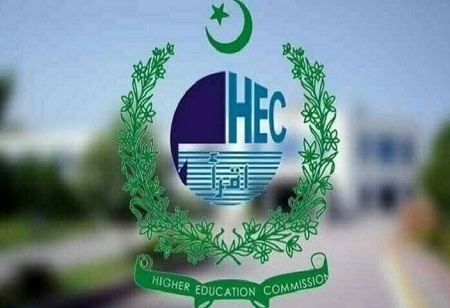The Higher Education Development in Pakistan (HEDP), a five-year project (2019/20-2023/24) being implemented by the Higher Education Commission (HEC) with support from the World Bank to expand upon key Higher Education Priorities in Pakistan, has achieved over 80 percent of its physical and 70 percent of financial targets. This was revealed in the seventh HEDP Steering Committee (SC) meeting held at HEC Secretariat. The Steering Committee is the highest forum of the project comprising senior officials from federal ministries, provincial higher education departments, vice chancellors, and private sector representatives. The committee members reviewed the progress made so far on the project.
Chairing the meeting, Executive Director HEC Mr. Awais Ahmed termed the project a key investment for higher education supported by the World Bank and said that, like every project, this project also has yearly financial and physical targets. “I am glad to share that the project has a good standing in achieving more than 80% of its physical targets and more than 70% of its financial targets”, he underlined.
He explained that all six components are progressing well on their deliverables, called performance-based conditions—may it be research grants, quality assurance cells, IT initiatives, capacity building, or financial autonomy. He expressed his satisfaction that, despite financial, procurement, and procedural challenges, the project is making good financial and physical progress. Project Coordinator Prof. Dr. Mehmood ul Hassan Butt gave an overview of the HEDP project, its history, progress, plans, and the recently held World Bank Mission that improved the project ranking as satisfactory. He and his team briefed the committee on the key project initiatives, including the physical and financial progress of all 11 performance-based conditions. In addition, it was apprised that the project is based on the HEC Vision 2025 and is just a launching pad for several futuristic initiatives that will eventually be taken over by the HEC staff to sustain these initiatives.
The technical heads of the project components updated members on the progress of each of the six components of the project, including the 28 Innovator Seed Funding grants awarded this year. In addition, a new grant called Rapid Technology Transfer Grants (RTTG) – focused on addressing Pakistan’s current financial distress by encouraging industry-academia collaborations to enable import substitutions. RTTG was launched this year for which the evaluation process is in the final stages. To sustain the industry-academia collaboration a Research for Innovation portal is also launched. HEDP has recently completed the establishment of Quality Enhancement Cells in Affiliated Colleges (QECACs) in 29 universities across Pakistan. In addition, the revised Undergraduate Education Policy (UEP) is finalized and is being rolled out to HEIs across Pakistan. The faculty of Affiliated Colleges (ACs) of KP, as well as Punjab, has already been trained on new UEP implementation while the plan for other provinces/regions including Sindh and Baluchistan will be rolled out very soon.
The IT component head briefed members on the expansion of the Pakistan Education Research Network (PERN) to ACs, and other initiatives like the Student Life Cycle system, Enterprise Resource Management and allied computing and storage capacities for HEIs, which are under various stages of procurement. The project also supported NAHE in conducting a women’s leadership program held in Sindh and Baluchistan to develop future women leaders for HE.

